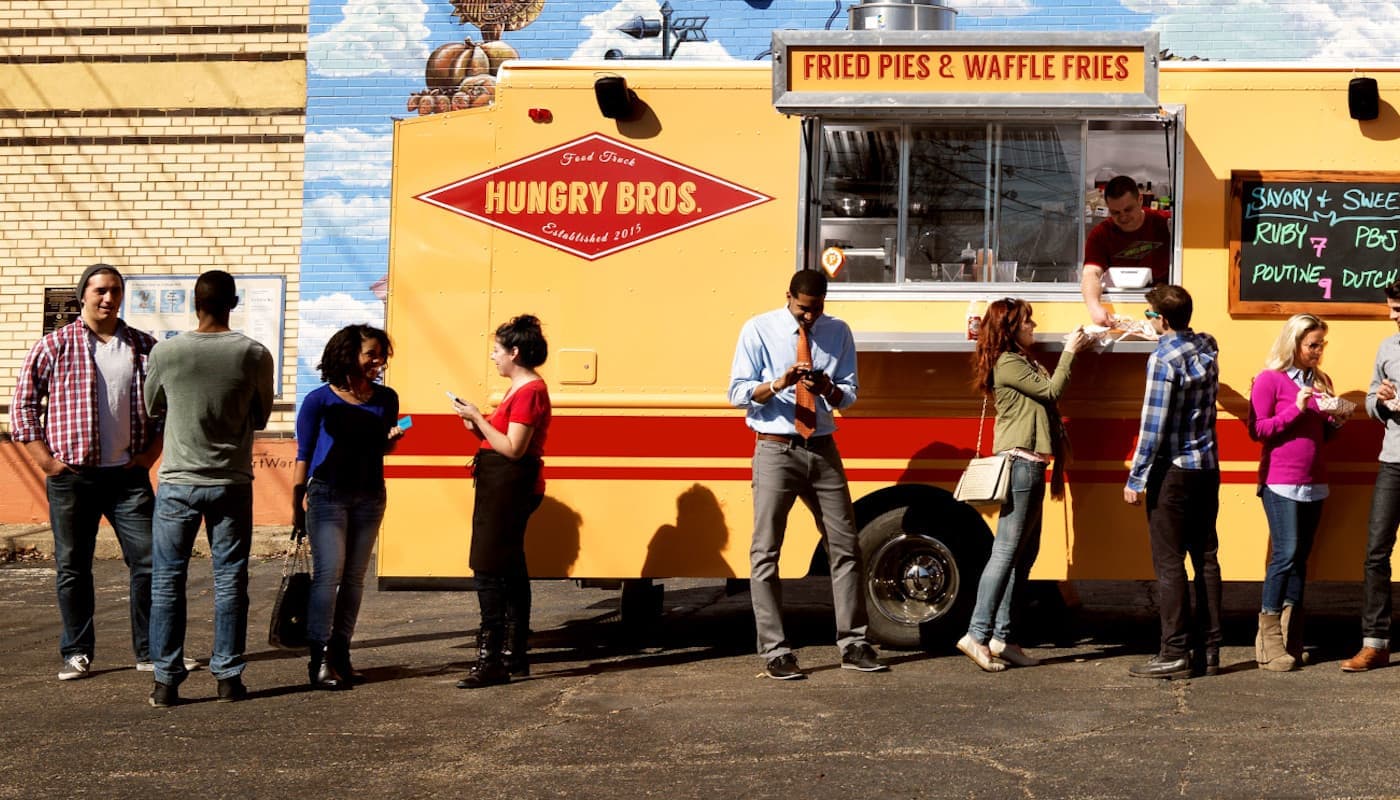How to start a food truck business
Editorial Team
6 min read
Entrepreneurs who love cooking often gravitate toward opening a restaurant. However, in 2021 and beyond, there are compelling reasons to start a food truck operation:
- You get to be your own boss, setting your own hours and partnering with the people you choose
- You can easily experiment with the menu, running specials and finding your next great dish
- The startup costs are low—at least compared to full-service restaurants
- You’re incredibly mobile, not tied to any single location in your service market
However, launching a mobile restaurant still requires advanced planning and preparation if you hope to succeed. This free guide to starting a food truck covers many of the things you need to know before selling your first menu item.
Creating a food truck business plan
As with any business venture, you need a roadmap in place (pun not intended) before committing any resources. Below are six critical steps that should go into your food truck plan.
1. Size up the market
The single most important step involves gauging demand, i.e., the public’s appetite for whatever it is you hope to sell. Fortunately, food truck operators have a lot more latitude than restaurant owners, since the former aren’t tied to a single location. So, consider driving around your potential service area to see:
- What foot traffic already exists
- What types of cuisine folks are already buying
- Whether breweries, parks, and other destinations are attracting people from beyond the neighborhood
Don’t be put off if you see lots of other food truck operators doing the same thing. This is a clear indication that demand already exists – it’s just a matter of carving out your niche.
2. Determine costs and secure funding
No discussion about how to start a food truck business would be complete without mentioning financing. You must determine whether you have the internal (or external) resources to launch your venture.
The usual necessities include the truck itself, equipment, ingredients, branding, advertising, and a host of legal and business expenses. If you have the money, covering these costs out of pocket is the simplest approach. However, some food truck operators have been able to secure financing from friends and family members or take out a business loan.
READ: How should you fund your small business? Here’s how to choose.
3. Become legal and legitimate
To run a food truck, you need to satisfy a number of zoning, licensing, and permitting requirements—not to mention food and safety inspections. These regulations vary by municipality and state, with cities such as Portland, Orlando, and Philadelphia ranking among the friendliest to food truck operators. By contrast, San Francisco, Boston, and the District of Columbia are some of the hardest markets to break into according to one report.
No matter where you live, it’s important you understand the local guidelines governing your service area.
4. Create your menu
There are several reasons why pizzas, tacos, gyros, burritos, and sandwiches are so popular in the food truck industry:
- Assembling many of these items is fast, easy, and inexpensive
- These dishes are handheld and portable
- These dishes may use minimal ingredients
- The required ingredients have a relatively long shelf life
Although you don’t have to necessarily sell these same staples, your menu should adhere to the time-tested principles of simplicity, speed, and affordability.
5. Get paid
Next, you need a way to securely accept payments. Cash is still an option, but roughly 40% of Americans say they almost always use credit cards, debit cards, and/or mobile payments. With that in mind, you’ll want to offer electronic payment processing, which allows customers to insert, swipe, or tap their cards or wave their smart devices over a wireless point of sale (POS) terminal.
While there are plenty of countertop POS systems, investing in a portable reader like the Clover Flex allows you to maximize the limited real estate in your truck’s interior. In fact, there are even POS terminals designed specifically for quick-service restaurants—whether yours is stationary or on wheels.
6. Spread the word
Knowing how to open a food truck isn’t enough to begin making sales – even if you’re parked in an area with lots of foot traffic. You still need to spread the word using food truck marketing ideas such as ads, social media, discounts, loyalty programs, and referrals. It may also be a good idea to park in the same place at the same time every day. This consistency could help maximize the probability of catering to repeat customers.
Setup costs: How much does it take to start a food truck?
Now you know what it could take to start a food truck, but what will it cost you to get the wheels turning?
There are many costs associated with launching, the vehicle itself being the biggest and most obvious expense. However, it is not uncommon to spend more just to bring your truck up to code with various fire and safety measures. You will also have legal fees, logos, vehicle wraps, and advertising – all of which can drive up the price even more.
This explains why the average food truck startup cost ranges anywhere from $50,000 to $180,000. This range doesn’t include ongoing costs, such as:
- Fuel and vehicle maintenance
- Insurance payments
- Permits and licenses
- Payroll and employee benefits
At Clover, we provide point-of-sale and payment solutions for small business owners – including entrepreneurs looking to break into the food truck industry. Even our most portable POS solutions – from the Clover Flex to the Clover Go – come with robust reporting features and the ability to integrate with apps to help manage payroll, accounting, and inventory functions. Check out the Clover App Market.
To learn how our payment processing solutions and POS technology can help your food truck business succeed, schedule a free consultation with our merchant services team today.
À La Cart Orlando: A successful food truck business plan
April and Dustin Williams, who moved from central Oregon to Orlando, Florida, own À La Cart Orlando. In Oregon, the Williams had fallen for a fun concept: food truck pods–clusters of food trucks arranged near outdoor seating. They brought the concept with them to Florida. In Orlando, they assembled a crew of complementary vendors to form a new food pod. To stir up business, they offer themed menu items, events, and keep their Clover devices like the Clover Go handy for busy nights.
A food truck can also be a launch pad for entrepreneurs who dream of opening a brick-and-mortar restaurant. Both Reyna’s Tacos and Salty Sistas found their groove–and their customers–as food trucks and leveled up to brick-and-mortar businesses. Operating a food truck can be a great opportunity to hone your skills, refine your dishes, and drum up customers for whatever your dream food business might be.
Learn how Clover helps quick-service restaurants and food trucks to the streets and beyond.
This information is provided for informational purposes only and should not be construed as legal, financial, or tax advice. Readers should contact their attorneys, financial advisors, or tax professionals to obtain advice with respect to any particular matter.
Related Posts
How to buy flowers wholesale: 5 tips for finding the right supplier
Win the waiting game: How to keep customers from leaving when tables are full – Part 2
Popular Topics
Stay in touch
Sign up and learn more about Clover.
Thank you for your subscription!
More posts about starting a small business
eBook
Retail roadmap: Financial goal-setting for the year ahead
Please share your contact information
to access our premium content.
Thank you for sharing your contact information.
Download Now





